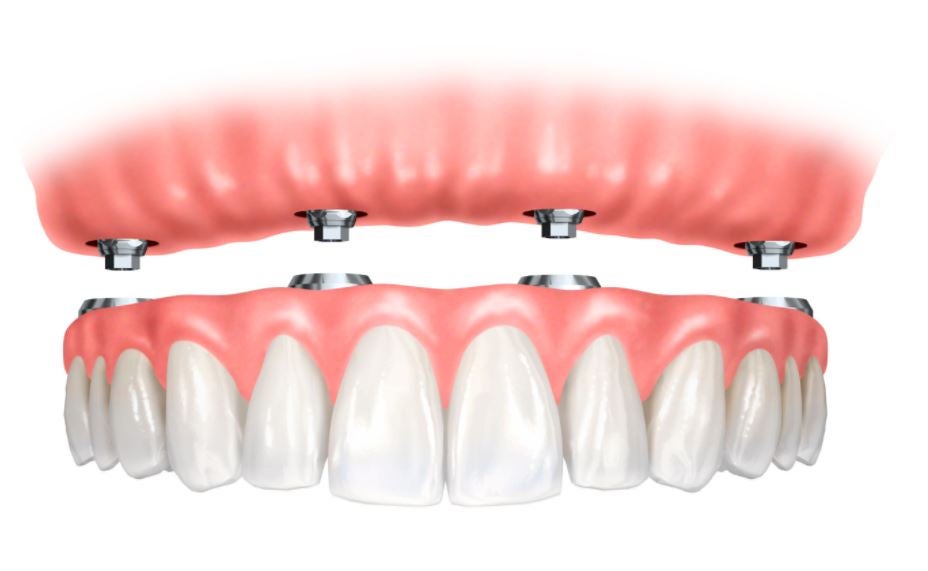The Facts About Dental Sense Revealed
Wiki Article
4 Simple Techniques For Dental Sense
Table of ContentsWhat Does Dental Sense Do?Everything about Dental SenseWhat Does Dental Sense Mean?Facts About Dental Sense Revealed
are medical tools operatively dental implanted right into the jaw to recover an individual's capacity to chew or their look. They give assistance for artificial (fake) teeth, such as crowns, bridges, or dentures. When a tooth is shed because of injury or condition, a person can experience difficulties such as fast bone loss, malfunctioning speech, or adjustments to chewing patterns that lead to pain.Dental implant systems are composed of an oral implant body and oral implant joint and may likewise consist of a joint addiction screw. Professional teeth whitening. The dental implant body is surgically inserted in the jawbone instead of the tooth's root. The dental implant abutment is typically affixed to the implant body by the joint fixation screw and extends via gum tissues right into the mouth to sustain the affixed artificial teeth
(https://dental-sense.webflow.io/)Framework of The Oral Implant System selecting oral implants, talk with your oral service provider regarding the prospective benefits and threats, and whether you are a prospect for the treatment. Things to take into consideration: Your general health and wellness is a crucial variable in establishing whether you are an excellent candidate for dental implants, the length of time it will require to heal, and how long the implant might remain in area.
Cigarette smoking might influence the recovery process and lower the lasting success of the implant. The healing procedure for the dental implant body may take several months or longer, during which time you normally have a temporary joint instead of the tooth. the dental implant treatment: Carefully follow the oral health instructions provided to you by your dental service provider.
Fascination About Dental Sense
Implant failure can result in the requirement for one more operation to repair or change the implant system. Recovers the capacity to chew Restores cosmetic appearance Aids maintain the jawbone from diminishing as a result of bone loss Preserves the wellness of the surrounding bone and periodontals Helps maintain surrounding (nearby) teeth secure Boosts top quality of life Damages to bordering natural teeth during implant placement Injury to the surrounding tissues during surgical procedure, such as sinus perforation Injury during surgical treatment (for example, fracture of bordering jawbone) Insufficient function, such as feeling like the teeth do not attack with each other typically A sensation that the tooth is loosened or turning in position arising from a joint screw loosening Implant body failure (looseness of the dental implant body) as a result of systemic infection, which might be a lot more most likely in patients with unrestrained diabetes mellitus because of local infection in bone and gum tissues sustaining read this the implant body as a result of delayed recovery, which may be much more likely in individuals who smoke Difficulty cleaning the gums around the implant, leading to poor oral hygiene Unattended periodontal disease Post-surgical pins and needles due to nerve impingement or damage Constantly notify health care service providers and imaging professionals that you have dental implants before any type of magnetic resonance imaging (MRI) or x-ray treatments.FDA is not familiar with any type of unfavorable occasions reported for MRI or x-ray treatments with oral implants. Dental implants systems are generally made of materials that follow worldwide agreement requirements of the International Organization for Standardization (ISO) or ASTM International. These standards have details of what makes a safe product.

A dental implant is a framework that changes a missing out on tooth. With screw-like devices, the cosmetic surgeon inserts an implant into the jawbone, and it acts as an anchor for a synthetic tooth, called a crown.
Dental Sense Things To Know Before You Get This
Some people are not eligible for dental implant surgical procedure. It is for oral specialists to operate on individuals with: severe illnessuncontrollable metabolic diseasebone or soft cells disease or infectionIf these issues are settled, a person can have the surgical treatment. In, oral specialists avoid operating on people with: If individuals with any of the above go through dental implant surgical treatment, there is a greater risk of the dental implant stopping working.
Dental dental implant surgical procedure is a personalized procedure. It's not the same for everyone. The adhering to offers a basic review of what you can anticipate your dental expert, dental surgeon, periodontist or prosthodontist to do: Position the dental implant surgically. Offer you time to heal. Affix the article and last crown, bridge or denture.
Next, your cosmetic surgeon will very carefully position the dental implant into your jaw. If your implant is near the front of your mouth, your dental expert will make a momentary tooth for you to wear up until you heal.
Get This Report on Dental Sense
During the recovery phase, your jawbone needs to fuse to the dental implant. This process can take anywhere from 3 to 9 months.As soon as your implant heals, your dentist can attach the joint (little port blog post) and your final repair (crown, bridge or denture). This usually takes regarding one hour to finish and might call for a second minor surgical procedure. You shouldn't feel any type of pain throughout your dental implant treatment because your service provider will use medicine to numb your gums.
Report this wiki page